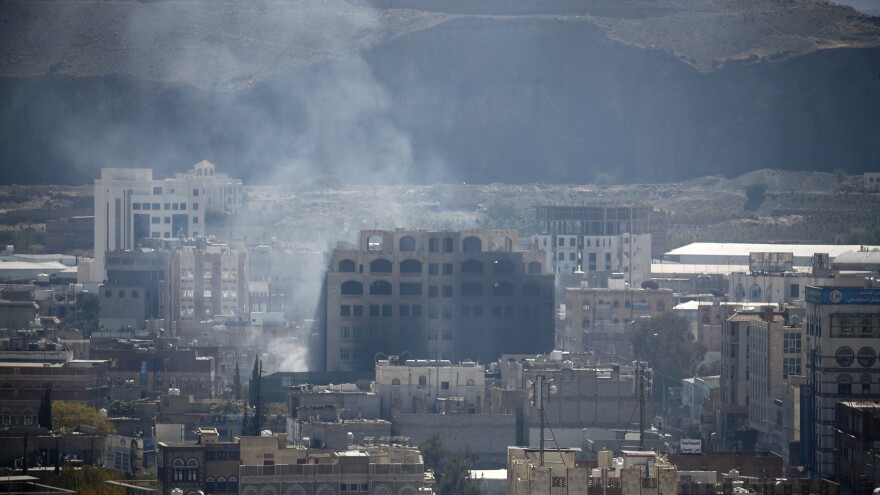In Sanaa, the capital of Yemen, Iran-backed Houthi rebels are clashing with supporters of former president Ali Abdullah Saleh — an outburst of deadly violence between two groups that have recently been allies.
Meanwhile, the Houthi rebels are claiming to have fired a missile at a nuclear power plant under construction in the United Arab Emirates. The claim has been denied by state media in UAE.
The WAM news agency also says that the UAE would have the ability to shoot down such a missile, if it were fired, The Associated Press reports.
Last month, Houthi rebels fired a missile at an international airport near Riyadh, Saudi Arabia. As we reported at the time, Saudi missile defense forces say they shot down that missile, although debris from the attack did rain down on the airport.
In retaliation for that missile, Saudi Arabia shut down land, air and sea routes into Yemen, restricting aid access. That blockade move that was criticized by human rights groups, which noted that Yemen's civilians were already suffering an acute humanitarian crisis that would only be exacerbated by a blockade.
Aid supplies began reentering Yemen about a week ago, after three weeks of Saudi blockade. The blockade continues to be partially enforced.
War has been raging in Yemen for more than two years. On the one side is currently exiled President Abed Rabbo Mansour Hadi, who is supported by a Saudi-led coalition. Hadi, a former deputy of Saleh who ousted that authoritarian leader to take power in 2011, is living in Saudi Arabia, while his government is currently located in Aden, a city in Yemen's south.
On the other side are the Houthi rebels and the supporters of former president Saleh, who joined forces to fight the Saudi-led coalition. As of last month, the Houthi and pro-Saleh controlled much of western Yemen, including the capital of Sanaa, the BBC reports.
But exactly who controls the capital now appears to be in dispute, as alliance between the Houthis and the Saleh supporters is splintering.
The BBC reports that former president Saleh has offered to initiate talks with the Saudi coalition, giving a televised speech in which he asked for an end to the siege on Yemeni ports and offered, in exchange, to "turn a new page" and "deal with them in a positive way."
The overture was welcomed by President Hadi and by the Saudi-led coalition, the BBC says. The Houthi rebels, meanwhile, called it "a coup against our alliance and partnership."
If the supporters of Saleh do switch sides and join the coalition and Hadi, "the Houthis would become completely isolated," The Associated Press reports.
For the past five days, the AP writes, Houthi and pro-Saleh forces have been clashing in the streets of Sanaa, with deadly consequences:
"According to Sanaa medical officials, nearly 75 people from both sides were killed and wounded in Sanaa's clashes. The officials, who spoke on condition of anonymity because they were not authorized to speak to the media, did not provide a breakdown for the casualties.
"The Sanaa street fighting seems to have split the capital in two parts, with the northern part under the Houthis and the southern under Saleh's fighters.
"Both sides have set up checkpoints, placed snipers on rooftops and sealed off entrances to the city, which slowed down street movement and traffic. Bombings and sporadic barrage of gunfire rocked the southern part of Sanaa on Sunday.
"Many of the state institutions - including the airport, the TV building and the official news agency - remain under the control of the Houthis, despite some earlier reports that Saleh's forces had taken over.
"A southern Sanaa district that houses the residential compound of Saleh and his family was engulfed in intense clashes.
"Saudi-run TV networks aired footage from Sanaa showing protesters tearing down posters in support of the Houthis and chanting against the rebels who have held the city and most of the country's north for the past two years."
On Friday, U.N. humanitarian chief Mark Lowcock appealed for the blockade on Yemen to be fully lifted, Reuters reports.
Twenty-five million people live in Yemen, Lowcock said, "and something like seven or eight million of them are, right now, on the brink of famine."
Copyright 2021 NPR. To see more, visit https://www.npr.org.



